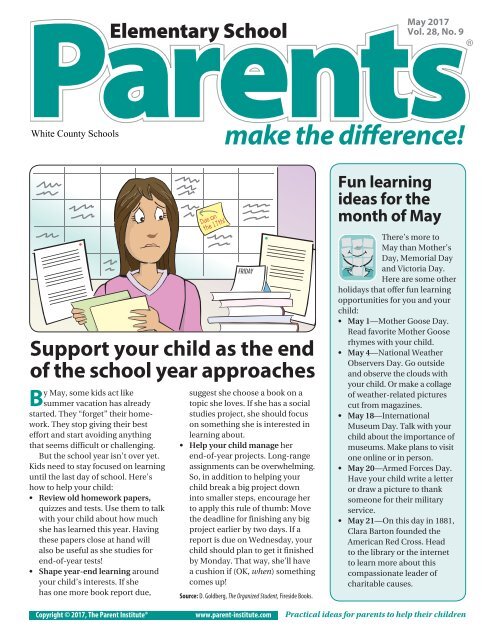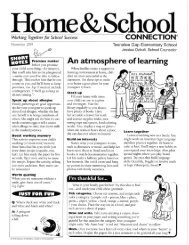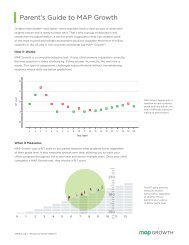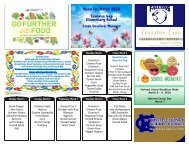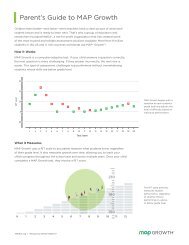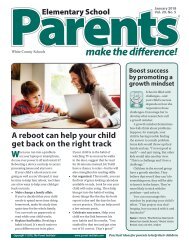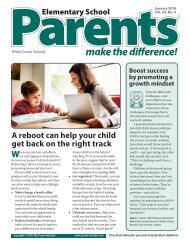elemmay17
You also want an ePaper? Increase the reach of your titles
YUMPU automatically turns print PDFs into web optimized ePapers that Google loves.
May 2017<br />
Vol. 28, No. 9<br />
®<br />
White County Schools<br />
make the difference!<br />
Support your child as the end<br />
of the school year approaches<br />
By May, some kids act like<br />
summer vacation has already<br />
started. They “forget” their homework.<br />
They stop giving their best<br />
effort and start avoiding anything<br />
that seems difficult or challenging.<br />
But the school year isn’t over yet.<br />
Kids need to stay focused on learning<br />
until the last day of school. Here’s<br />
how to help your child:<br />
• Review old homework papers,<br />
quizzes and tests. Use them to talk<br />
with your child about how much<br />
she has learned this year. Having<br />
these papers close at hand will<br />
also be useful as she studies for<br />
end-of-year tests!<br />
• Shape year-end learning around<br />
your child’s interests. If she<br />
has one more book report due,<br />
333333333<br />
suggest she choose a book on a<br />
topic she loves. If she has a social<br />
studies project, she should focus<br />
on something she is interested in<br />
learning about.<br />
• Help your child manage her<br />
end-of-year projects. Long-range<br />
assignments can be overwhelming.<br />
So, in addition to helping your<br />
child break a big project down<br />
into smaller steps, encourage her<br />
to apply this rule of thumb: Move<br />
the deadline for finishing any big<br />
project earlier by two days. If a<br />
report is due on Wednesday, your<br />
child should plan to get it finished<br />
by Monday. That way, she’ll have<br />
a cushion if (OK, when) something<br />
comes up!<br />
Source: D. Goldberg, The Organized Student, Fireside Books.<br />
Fun learning<br />
ideas for the<br />
month of May<br />
There’s more to<br />
May than Mother’s<br />
Day, Memorial Day<br />
and Victoria Day.<br />
Here are some other<br />
holidays that offer fun learning<br />
opportunities for you and your<br />
child:<br />
• May 1—Mother Goose Day.<br />
Read favorite Mother Goose<br />
rhymes with your child.<br />
• May 4—National Weather<br />
Observers Day. Go outside<br />
and observe the clouds with<br />
your child. Or make a collage<br />
of weather-related pictures<br />
cut from magazines.<br />
• May 18—International<br />
Museum Day. Talk with your<br />
child about the importance of<br />
museums. Make plans to visit<br />
one online or in person.<br />
• May 20—Armed Forces Day.<br />
Have your child write a letter<br />
or draw a picture to thank<br />
someone for their military<br />
service.<br />
• May 21—On this day in 1881,<br />
Clara Barton founded the<br />
American Red Cross. Head<br />
to the library or the internet<br />
to learn more about this<br />
compassionate leader of<br />
charitable causes.<br />
Copyright © 2017, The Parent Institute® www.parent-institute.com Practical ideas for parents to help their children
Copyright © 2017, The Parent Institute®<br />
Help your child maintain a love<br />
of learning all summer long<br />
Even if your child<br />
complains about school,<br />
chances are he likes<br />
learning. Here are<br />
some ways to maintain<br />
your child’s interest in learning<br />
all summer long:<br />
• Make time to talk. Studies have<br />
shown that kids whose families<br />
have frequent discussions about<br />
many subjects tend to have<br />
higher IQs.<br />
• Build on your child’s interests.<br />
For example, if your child loves<br />
playing the guitar, read books<br />
about the instrument, go to a free<br />
concert, or encourage him to write<br />
to a famous guitarist.<br />
• Try a new activity you can do with<br />
your child, such as a sport. Choose<br />
something he’s excited about.<br />
It’s a busy morning.<br />
You need to leave the<br />
house on time but your<br />
child seems to be set<br />
on super-slow-motion.<br />
Adults live in a time-oriented<br />
world. You check the time on your<br />
watch. You glance at the clock on<br />
your phone to be sure you’re at work<br />
on time. But kids? Their views of<br />
time seem to be a lot more flexible.<br />
To help your child become more<br />
responsible with time:<br />
• Be a good role model. When<br />
you’re in a mad dash to get out<br />
the door, you’re not showing your<br />
child the importance of getting<br />
ready early.<br />
• Build in routines that help. Take<br />
five minutes in the evening to<br />
prepare for the next day. Create a<br />
Show how interested you are in<br />
learning and improving—and that<br />
you never give up.<br />
• Become tourists in your own town.<br />
Try to see your town through fresh<br />
eyes. Check out an exhibit at a<br />
local museum or library. Explore<br />
a different trail at a local park.<br />
• Set an example by learning more<br />
about the things you love. If you<br />
enjoy cooking, take a cooking<br />
class, check out a cookbook at the<br />
library or try a new recipe. Invite<br />
your child to help.<br />
“Live as if you were to die<br />
tomorrow. Learn as if you<br />
were to live forever.”<br />
—Mahatma Gandhi<br />
Teach your dawdling child to<br />
be more responsible with time<br />
“launch pad” by your door where<br />
your child can put all those things<br />
(backpack, gym shoes, permission<br />
slips) that she will need.<br />
• Don’t nag. You’ll make your child<br />
anxious—but you probably won’t<br />
make her hurry up. Instead, look<br />
for concrete actions that will<br />
actually make a difference. Help<br />
her put on her coat. Pick up her<br />
backpack and hand it to her.<br />
• Make it a game. Most kids love<br />
competition. So challenge your<br />
child to put on her shoes before<br />
you finish counting to 20.<br />
• Follow a predictable schedule as<br />
much as possible. It’s the best way<br />
to help your child develop a sense<br />
of time. Say, “In five minutes, it<br />
will be time for breakfast.” Or,<br />
“After dinner, we’ll read a story.”<br />
2 • Elementary • Parents make the difference! • May 2017<br />
www.parent-institute.com<br />
Are you helping<br />
your child prepare<br />
for year-end tests?<br />
The end of the year<br />
often means lots of tests<br />
for students. Are you<br />
preparing your child<br />
to do her best on them?<br />
Answer yes or no to the questions<br />
below to find out:<br />
___1. Do you write down test dates<br />
on your family calendar and avoid<br />
planning big activities on the day<br />
before a test?<br />
___2. Do you encourage your child<br />
to study a little each day instead of<br />
cramming the night before a test?<br />
Research shows this is the best way<br />
to learn and remember facts.<br />
___3. Do you make sure your child<br />
gets a good night’s sleep and eats a<br />
healthy breakfast before a big test?<br />
___4. Do you encourage your child<br />
to wear comfortable clothing and<br />
dress in layers on test days?<br />
___5. Do you tell your child that you<br />
have confidence in her and know she<br />
will give her best effort?<br />
How well are you doing?<br />
Mostly yes answers mean you’re<br />
giving your child the support she<br />
needs to do her best on tests. For<br />
no answers, try those ideas.<br />
make the difference!<br />
Practical Ideas for Parents to Help<br />
Their Children. ISSN: 1523-1275<br />
1046-0446<br />
For subscription information call or write:<br />
The Parent Institute ® , 1-800-756-5525,<br />
P.O. Box 7474, Fairfax Station, VA 22039-7474.<br />
Fax: 1-800-216-3667.<br />
Or visit: www.parent-institute.com.<br />
Published monthly September through<br />
May by The Parent Institute ® , a division of<br />
PaperClip Media, Inc., an independent,<br />
private agency. Equal opportunity employer.<br />
Copyright © 2017 PaperClip Media, Inc.<br />
Publisher: L. Andrew McLaughlin.<br />
Publisher Emeritus: John H. Wherry, Ed.D.<br />
Editor: Rebecca Hasty Miyares.<br />
Illustrator: Joe Mignella.<br />
®<br />
X02337958
www.parent-institute.com<br />
Everyday tasks can help your<br />
child strengthen math skills<br />
Most people read every<br />
day. They probably do<br />
math, too, although they<br />
may not realize it. Math<br />
is a natural part of life,<br />
and it’s important to include your<br />
child in daily math activities.<br />
With your child, you can:<br />
• Take a trip. Before leaving,<br />
measure the air pressure in your<br />
car or bike tires. Also calculate<br />
how many miles you’ll go. If you<br />
are driving, how much gas will<br />
you use? As you travel, say a number<br />
between 1 and 10. Who can<br />
find a license plate with numbers<br />
that add up to the number you<br />
called out?<br />
• Follow recipes. When preparing<br />
meals, let your child help with<br />
weighing and measuring. Discuss<br />
sizes, shapes and fractions. Find<br />
answers to questions such as,<br />
How to handle situations that<br />
often result in school absences<br />
Your child woke up<br />
late and can’t get going.<br />
He has a big test today<br />
and forgot to study for<br />
it last night.<br />
Things like this happen all the<br />
time. And parents sometimes wonder<br />
if missing a day of school here and<br />
there is really a big deal.<br />
The answer is yes. Attending<br />
school regularly is important—right<br />
up to the very last day.<br />
Here are a few of the top reasons<br />
kids miss school and some ways to<br />
prevent those absences:<br />
1. Your child feels sick. If he doesn’t<br />
have a fever and isn’t showing<br />
signs of illness (vomiting, coughing,<br />
diarrhea), he can probably<br />
“How could we double this recipe?”<br />
and “When we add ¼ cup to ¼<br />
cup, what do we get?”<br />
• Go shopping. Use a calculator<br />
to keep a running tally of purchases.<br />
Use coupons to inspire<br />
math problems. “If we use this<br />
coupon, will the item cost less<br />
than other brands?” “Which of<br />
these items is really the best deal<br />
per pound?”<br />
• Save money. Help your child<br />
choose a goal, such as saving<br />
for a book. Make a chart to help.<br />
How much does she need to save<br />
each week? How long will it take<br />
her to reach the total? Keep track<br />
of how well she is doing. Then<br />
have fun shopping together!<br />
• Play games. There are lots of<br />
fun math games you can play<br />
together. Try dominoes, Uno<br />
and Connect 4.<br />
go to school. If you do keep him<br />
home, don’t make it a vacation. A<br />
child who is too sick to go to school<br />
is too sick to watch TV, text friends<br />
or play on the computer.<br />
2. Your child won’t get up. Make his<br />
bedtime earlier. Help him get<br />
ready for school the night before.<br />
3. He isn’t prepared. Forgetting to<br />
study for a test and running out of<br />
time to complete a project are not<br />
valid excuses for missing school.<br />
Expect your child to plan ahead<br />
and let him face the consequences<br />
when he doesn’t.<br />
4. Your child is worried. Talk with<br />
him. Is he struggling in a class?<br />
Is a classmate bothering him at<br />
school? Talk with the teacher.<br />
Copyright © 2017, The Parent Institute®<br />
Q: My son is starting middle<br />
school next year. He won’t be<br />
attending the same school as most<br />
of his friends. He’s very anxious<br />
about this move. What can I do<br />
over the summer to help him<br />
make the adjustment?<br />
Questions & Answers<br />
A: Middle school is a really big<br />
adjustment for any child. Instead<br />
of having one teacher, your son<br />
will have several. Instead of staying<br />
in one classroom, he will have to<br />
move from room to room. Instead<br />
of being in the highest grade level<br />
in the school, he will now be in<br />
the lowest.<br />
It is completely normal for your<br />
son to feel anxious about this<br />
transition. To help him feel a little<br />
more confident:<br />
• Sign up for a tour. See if he can<br />
take a tour while classes are in<br />
session. Just walking around the<br />
building and seeing students<br />
will give your child a better idea<br />
of what to expect (and even<br />
what to wear) on his first day.<br />
• Buy a combination lock and<br />
have him practice opening it.<br />
Lockers are a big source of<br />
anxiety for many kids. Even if<br />
your child has to learn a new<br />
combination when school starts,<br />
he’ll feel confident that he can<br />
open and close his locker.<br />
• Remind him that he won’t be<br />
the only new kid in his school.<br />
Everyone will be starting fresh.<br />
Assure him that he’ll still have<br />
opportunities to see his old<br />
friends, even if they’re at a<br />
different school.<br />
• Check out school activities.<br />
If your son can get started on<br />
a team or in the band over<br />
the summer, he’ll make some<br />
new friends and start school<br />
knowing some kids.<br />
May 2017 • Elementary • Parents make the difference! • 3
• Copyright © 2017, The Parent Institute®<br />
It Matters: Summer Learning<br />
Treat reading<br />
as an enjoyable<br />
summer activity!<br />
To keep your child<br />
reading over the summer,<br />
treat it like any<br />
other summer activity.<br />
Let it be something he<br />
can do whenever he feels like it.<br />
Show him that reading can be fun.<br />
And never make summer reading<br />
feel like homework.<br />
If you help your child make the<br />
connection between books and the<br />
simpler pleasures of childhood, his<br />
desire to read may last a lifetime.<br />
To take a summer approach to<br />
reading:<br />
• Suggest that your child reread a<br />
favorite book. Then find another<br />
book by the same author. Or find<br />
one on the same topic.<br />
• Connect books with summer<br />
activities—sports books for<br />
a summer league player, for<br />
instance, or camping books<br />
for a camper.<br />
• Let your child stay up past<br />
bedtime when a book is just<br />
too good to put down.<br />
• Start your child on a series of<br />
fiction or thriller books. These<br />
page-turners hook kids into a<br />
reading habit.<br />
• Encourage a change of venue.<br />
Read books at the beach or pool,<br />
in a tent or at the park.<br />
• Watch movies, videos and plays<br />
based on children’s books. Then<br />
read the book together and<br />
compare it with what you saw.<br />
• Share your favorite books and<br />
magazines with your child.<br />
• Encourage your child to retell<br />
stories or parts of stories from<br />
the books he reads.<br />
The summer is a great time for<br />
your child to begin writing in a<br />
journal. All he needs is an empty<br />
notebook and a few ideas to get<br />
started.<br />
Suggest that he keep:<br />
• A research log. Have your child<br />
pick a subject he loves, such as<br />
skateboarding. Over the summer,<br />
he can research and write<br />
about it. What are some cool<br />
skateboard tricks? How long are<br />
skateboards? Who holds records<br />
for skateboarding?<br />
• A travel log. Each time he<br />
goes somewhere special—<br />
whether it’s far away or close<br />
to home—he can keep a record<br />
by taking pictures, drawing or<br />
writing notes. What did he see?<br />
Who did he meet? What did he<br />
think about what he saw?<br />
The lazy days of<br />
summer can lead to<br />
lazy hours in front<br />
of the TV, computer<br />
or game system. But<br />
experts say it’s important to limit<br />
recreational screen time.<br />
Encourage your child to:<br />
• Be the entertainment. Instead<br />
of watching a show, your child<br />
can create one! Have her choose<br />
an exciting story line and act<br />
it out with friends or stuffed<br />
animals.<br />
• Play classic games. Fill a bucket<br />
with traditional summer toys,<br />
www.parent-institute.com<br />
Inspire journal writing this<br />
summer with creative ideas<br />
• An observation log. Suggest<br />
that your child observe something<br />
over a period of time,<br />
such as a summer vegetable as<br />
it grows. Or he can pick something<br />
to describe in great detail,<br />
such as a bug or an animal.<br />
Don’t let your child waste the<br />
summer in front of a screen<br />
including sidewalk chalk, balls,<br />
bubble stuff and water sprayers.<br />
When the weather is right, have<br />
your child take it outside for<br />
hours of fun.<br />
• Plan a treasure hunt. Hide<br />
lots of clues, with each one<br />
leading to the next. This can<br />
be done outside or inside.<br />
The last clue should lead to<br />
a treasure, such as a yummy<br />
snack or a fun activity.<br />
• Get some exercise. Go for a walk<br />
or ride bikes together. Toss or<br />
kick a ball around. Play a game<br />
of hopscotch on the sidewalk.<br />
4 • Elementary • Parents make the difference! • May 2017


